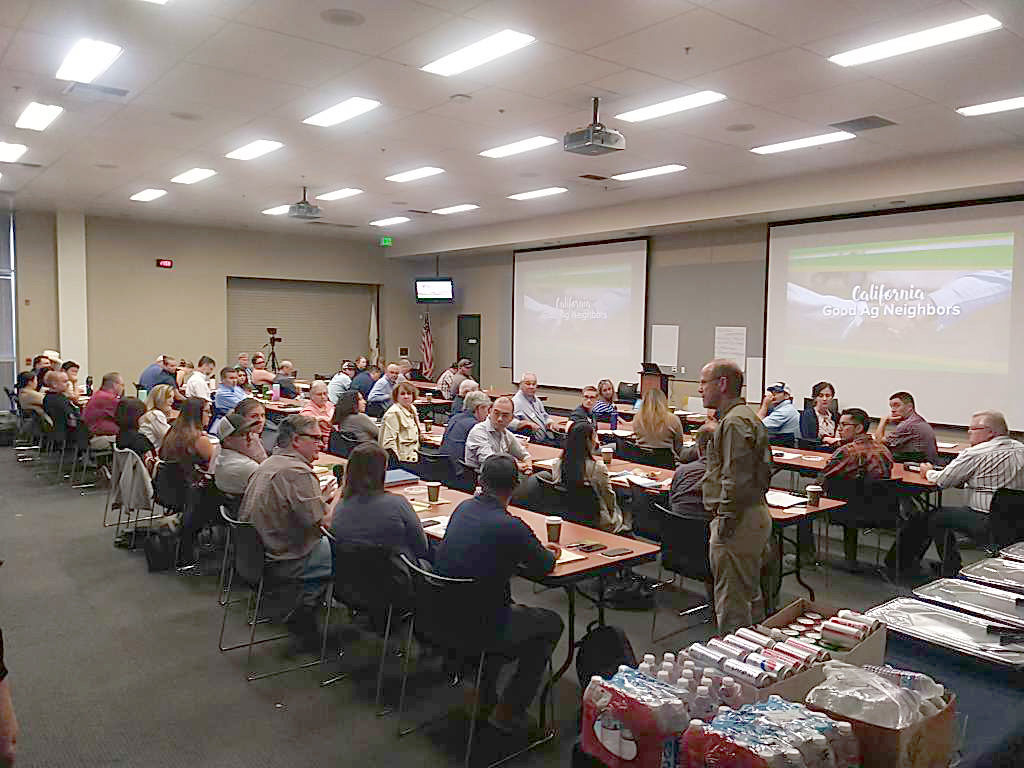Workshops bring farmers, scientists and regulators together to strengthen produce safety
Mike Payne – June 26, 2019

Moderator Joseph McIntyre leads a group discussion at the Good Agricultural Neighbors workshop in Stockton.
Livestock ranches and fresh produce farms in California are among the most highly regulated commodities in the country, but confusion often exists about what each community does to assure food safety.
As California Department of Food and Agriculture, (CDFA), Secretary Karen Ross explains in an interview with California Ag Today, “Agriculture is complex,” she said, “This is particularly true in California, where diverse agricultural operations often exist side-by-side, with each of them required to comply with a myriad of regulations designed to protect the public, the environment, and the food supply.”
To better understand and leverage those efforts, the University of California-Davis and the CDFA brought together diverse stakeholders to discuss the safety of fresh produce grown in the vicinity of wildlife and livestock. Workshops designed for produce growers and livestock facility operators to promote food safety were held in the Imperial Valley (Holtville) on June 11 and the Central Valley (Stockton) on June 13.
The California Good Agriculture Neighbors Workshops facilitated dialogue between different sectors of California agriculture about cooperation to prevent future food borne illness outbreaks.
Focusing on feeding operations, morning speakers reviewed existing laws and practices protecting food and environmental safety, such as air district and water board regulations. Relative to produce production, speakers described FDA’s new Food Safety Modernization Act, FSMA, as well as California’s Leafy Green Marketing Order. Participants also heard about real case-histories from outbreak investigations as well as the current status of research exploring everything from reducing E. coli shedding with feed additives and vaccines to novel post-harvest technologies for fresh produce.
Natalie Krout, CDFA’s Division Director for Inspection Services, was pleased by both the packed meeting rooms and the participant’s enthusiasm. “These workshops were great opportunities for diverse partners to hear each other’s points of view and collaborate on research priorities and management practices to further our knowledge and prevent foodborne illness,” Krout said.
After lunch hosted by Western Growers and the California Beef Council, participants broke into small groups to discuss future avenues. Cattle feeders, dairymen and produce growers brainstormed on everything from research priorities to how neighborly communication can improve food safety. David Ingram with FDA’s Division of Produce Safety thought the candid round-table style discussions helped to initiate meaningful discussions how to move forward. “FDA has long supported the co-management of livestock with produce and stands ready to help initiate studies to bolster gaps in the science that these workshops highlighted,” said Ingram.
Hank Giclas, Vice President for the Western Growers Association also saw value in the meetings, remarking, “The recent good neighbor workshops remind us that we are all committed to safe high-quality food and that we have many opportunities to work together for the betterment of our industry and customers.”
Danny Martins, a Modesto-area dairy producer, thought the meeting started discussions and collaborations that would ultimately benefit all segments of the state’s agriculture. He says that, “No matter what you’re growing or raising, all California ag is joined at the hip.”
For stakeholders that couldn’t attend the workshops, video recordings and handout materials are available here.
Acknowledgments: Workshops were organized by the Western Institute for Food Safety and Security (WIFSS), the Western Center for Food Safety (WCFS), and the University of California Cooperative Extension (UCCE). Workshops are made possible using Grant Program PAR-16-137 funding provided by United States Food and Drug Administration (FDA) and administered through a cooperative agreement with the California Department of Food and Agriculture (CDFA).
